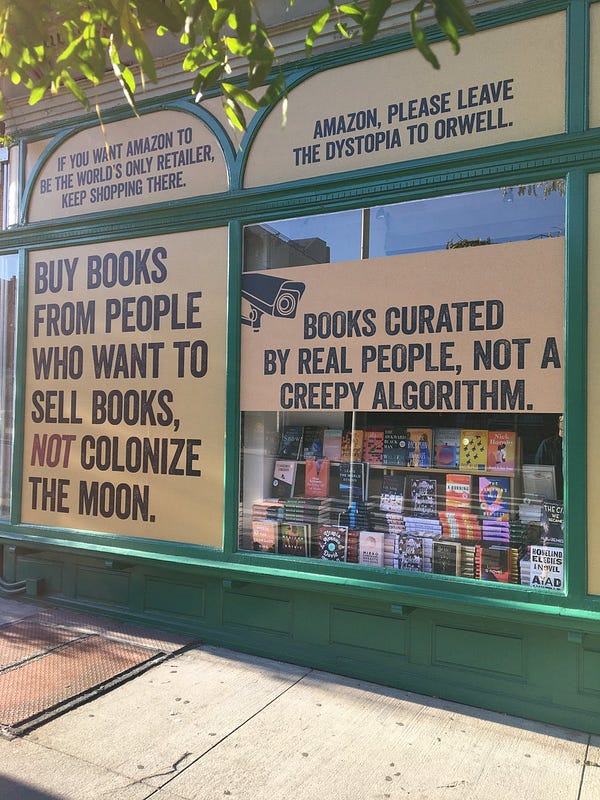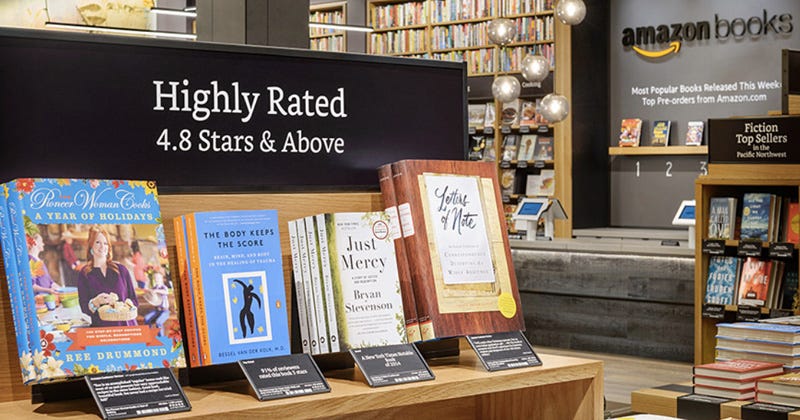Algocult: Fear of the Algorithm (plus quarantine colors)
Part boogie man and part reality, "the algorithm" is what people blame when they're critiquing digital capitalism.
New Work:
— For ARTnews, I discovered the Quarantine Palette: house paint brands are booming during the pandemic as everyone gets bored of their walls, and buyers are turning toward specific colors like soft blues, greens, and beige, perhaps to calm anxiety. These are the colors of quarantine.
— I was on designer Jarrett Fuller’s great podcast Scratching the Surface. We talked about the facade of minimalism, systems of cultural production, and how a lot of my writing comes down to ideas about design and structure.
Fear of the Algorithm
Two weeks ago, a bunch of independent bookstores launched a provocative marketing campaign. They wrapped their stores in cardboard signs, mimicking Amazon’s omnipresent delivery boxes, to tell customers to stop buying from that technological behemoth. I was struck by the campaign’s copy. The writers at the agency DCX Growth Accelerator, which created the project, did a great job:


It is weird that we patronize a monopolistic company that is involved in so many other, larger, more exploitative businesses — web servers, space travel, generic fashion manufacturing — to participate in the relatively small, intimate economy of book publishing and reading. The line “books curated by real people, not a creepy algorithm” stood out since it reiterates a few of the themes that I’ve addressed in this newsletter.
There’s the emphasis on “curation”: Books are better when they’re selected for you by real humans instead of an algorithmic platform calculating a guess based on your previous actions. Curation is what so many platforms purport to offer — a selection of content that reflects your interests — whether Netflix, Twitter, or TikTok, but curation is also what I miss most from going to physical bookstores.
The table displays at a store like McNally Jackson (my favorite in the world) are a daily reflection of the state of publishing, a selection that goes beyond your taste and pre-existing knowledge as much as it caters to them. There will always be books that aren’t bestselling or mainstream but were selected by the staff because they’re worth highlighting. Perceived quality or significance is as important as popularity. Good curation is just as likely to resist the dominant ideas or news of the day as reflect them. We trust the booksellers to challenge us in all the right ways.



Then there’s the “creepy algorithm” part of the text. First, it positions “the algorithm” as a monolithic, nebulous, almost anthropomorphized entity, though that’s not really the case, as I’ve written before. But it also reflects the sense that algorithms’ automation of judgement, making so many decisions for us every day about what to consume via automated feeds, is invasive. The deep surveillance that algorithms depend on for data feels like a betrayal, even if we do get some funny TikTok videos in return. We increasingly distrust their influence and prefer the opposite, “real people,” the dichotomy that this line of copy creates. Here, algorithmic judgement is not “real” or human.
Such creepiness is obvious when you compare an indie bookstore’s shelves to the shelves of one Amazon’s bookstores, which are like the company’s website homepage but in the physical world. Here’s one example:

Everything in the Amazon Bookstore is displayed by rating. The more reviews and the more stars a book gets, the more important it seems to be, the more deserving of attention. Popularity is the only metric that matters — the reader is expected to like whatever most others readers already like. There’s no sense that an unpopular book might still speak to a small audience and still matter, no sense that the shelves are presenting something just for you — which is often the case for me at McNally, though I know many other people feel the same way.
That’s not to say books that sell a lot of copies or get a lot of reviews are bad. In this photo I see The Body Keeps the Score and Fates and Furies, two books I’ve heard no end of great things about. But popularity is never going to be the most important metric for long-lasting culture, and it certainly fails as a method of curation. The Amazon bookstore shelves are relentlessly boring; there’s no real sense of discovery.
Good curation brings us what we don’t know yet: unheard voices, overlooked works, and missing context. What’s creepy about algorithmic recommendations is that all of that is missing and yet we’re supposed to think they’re somehow more personal, more specific.
This newsletter is a series of short essays on algorithmic culture and updates on the rest of my writing. Reply to send me thoughts, comment below, or email chaykak@gmail.com.
— Follow me on Twitter
— Buy my book on minimalism, The Longing for Less
— Read more of my writing: kylechayka.com
